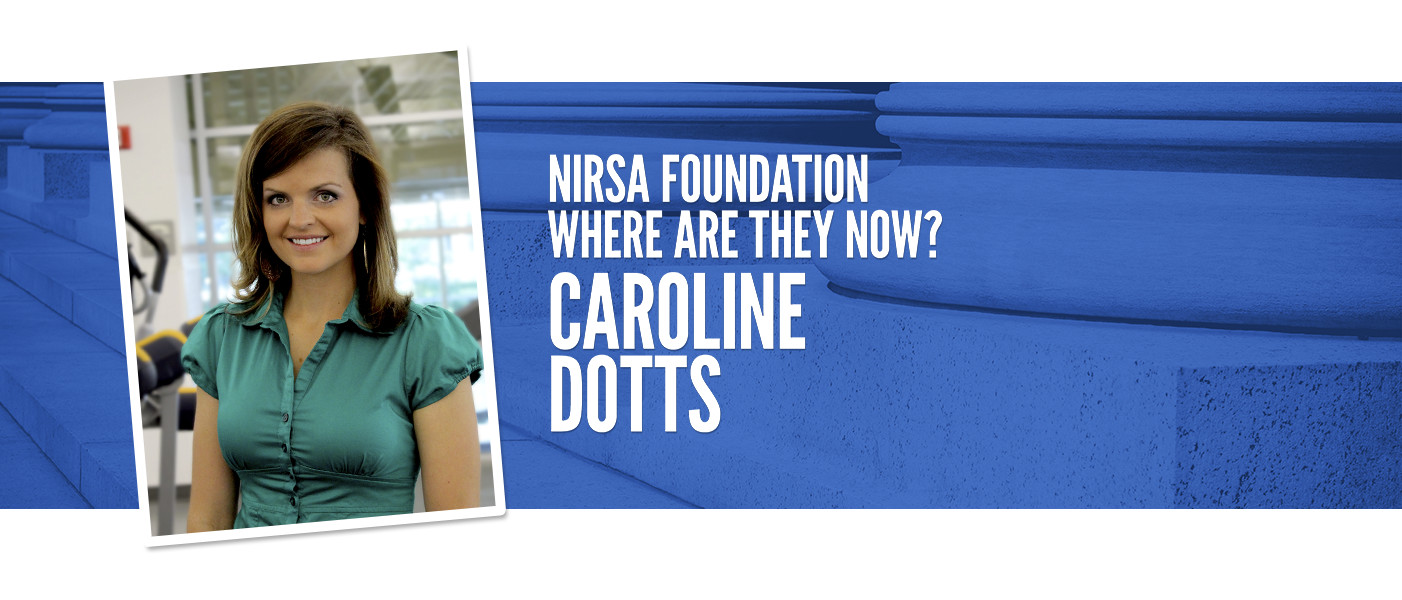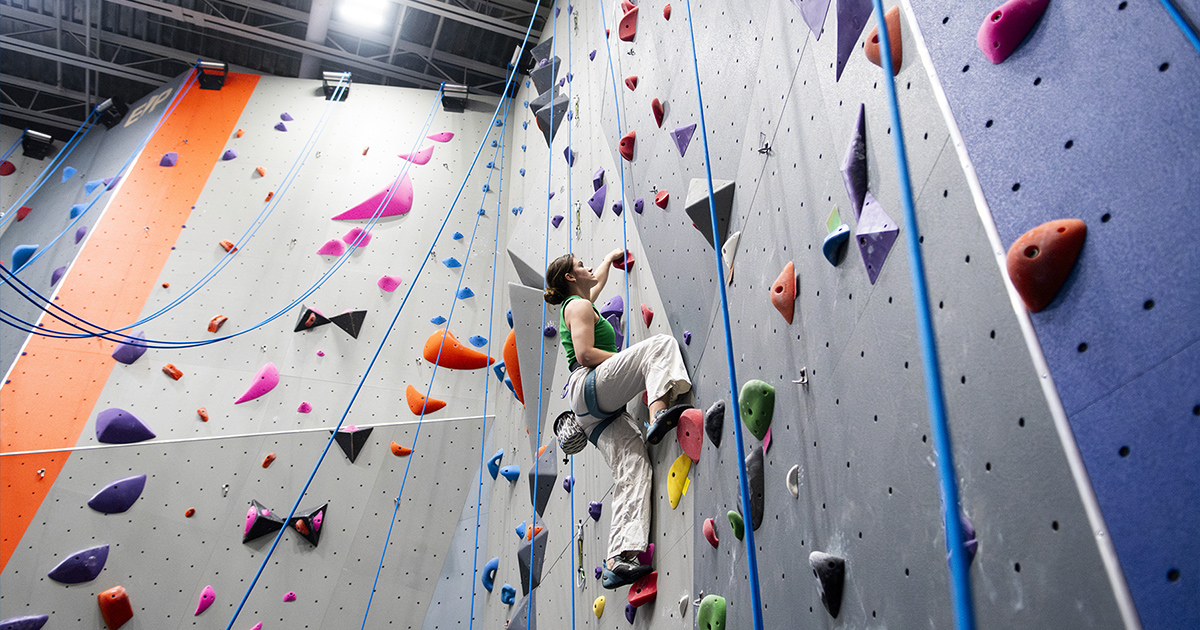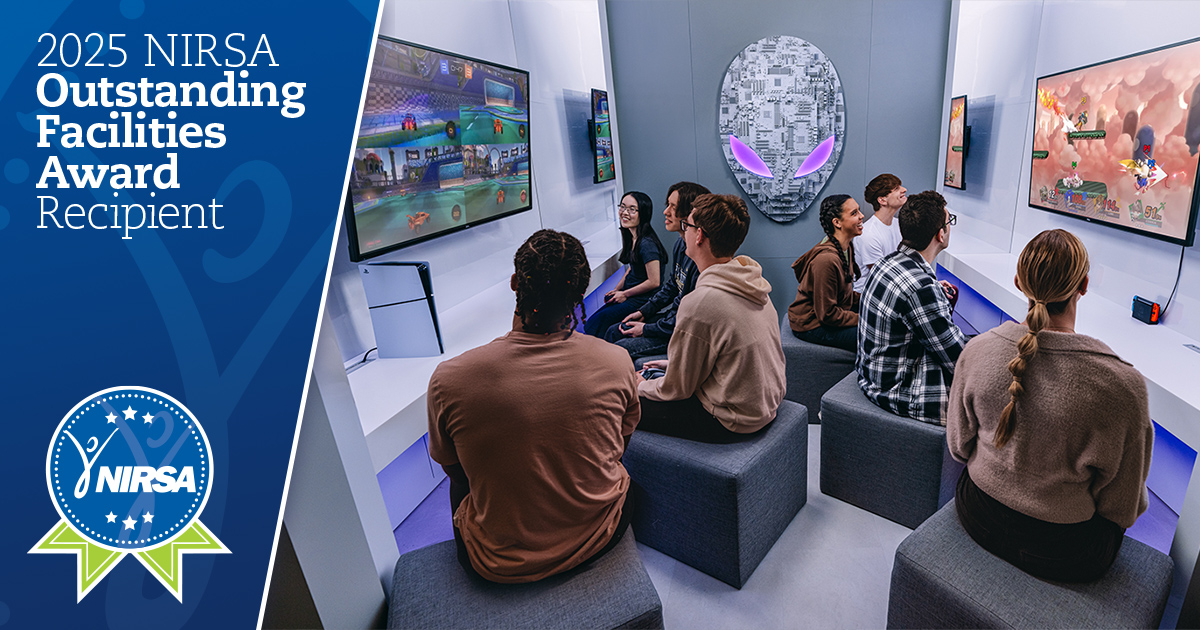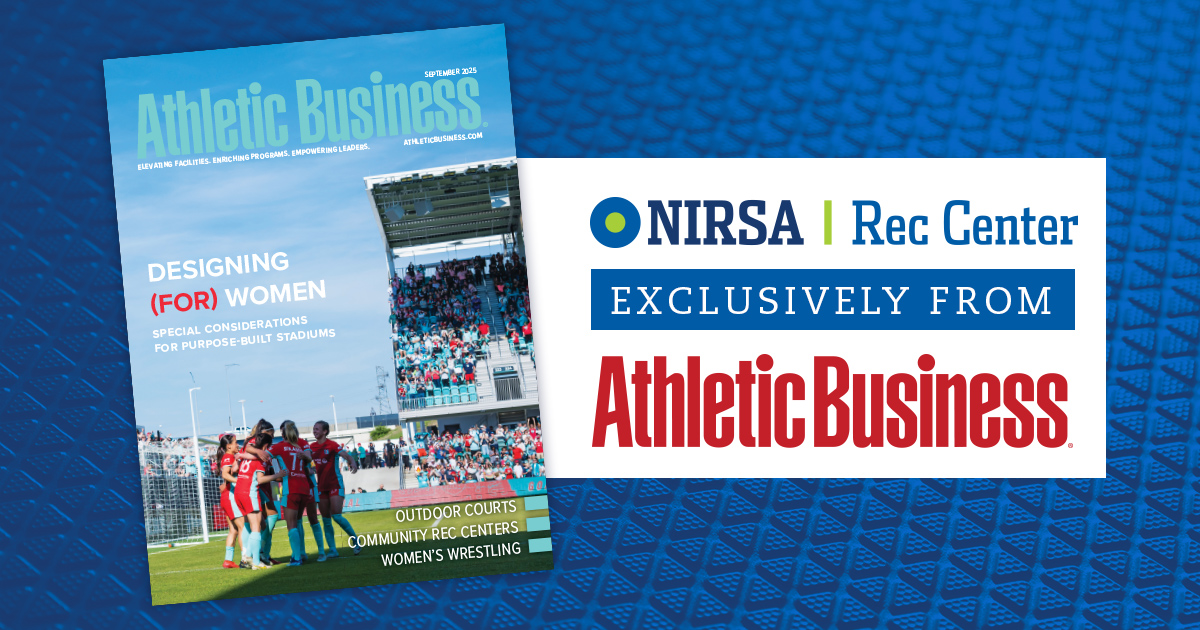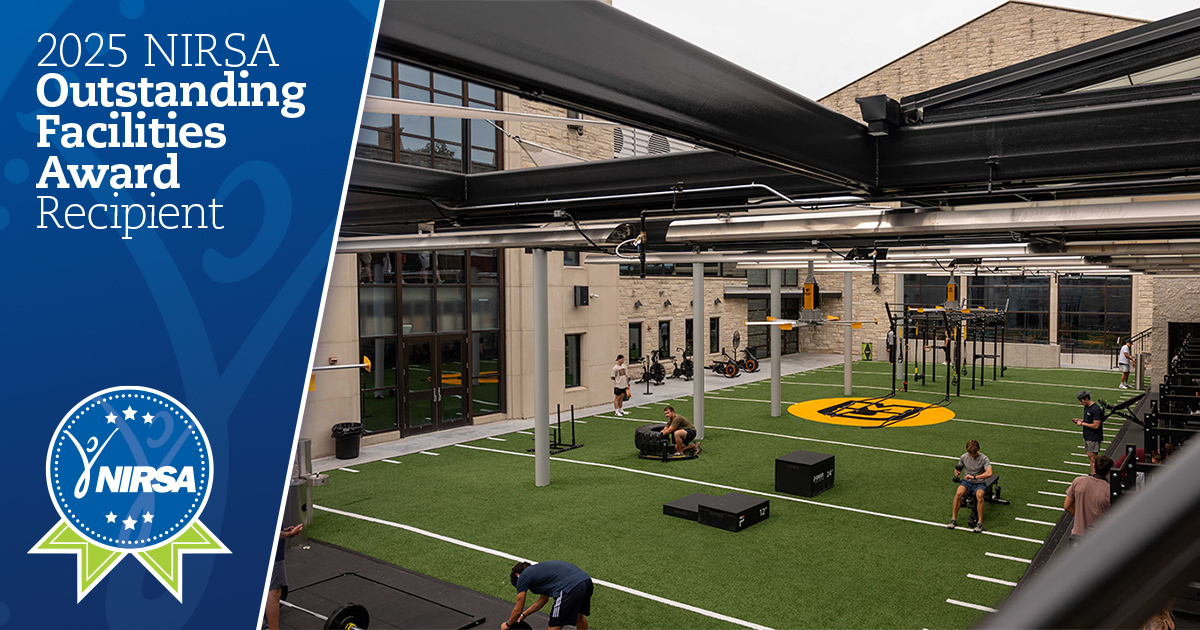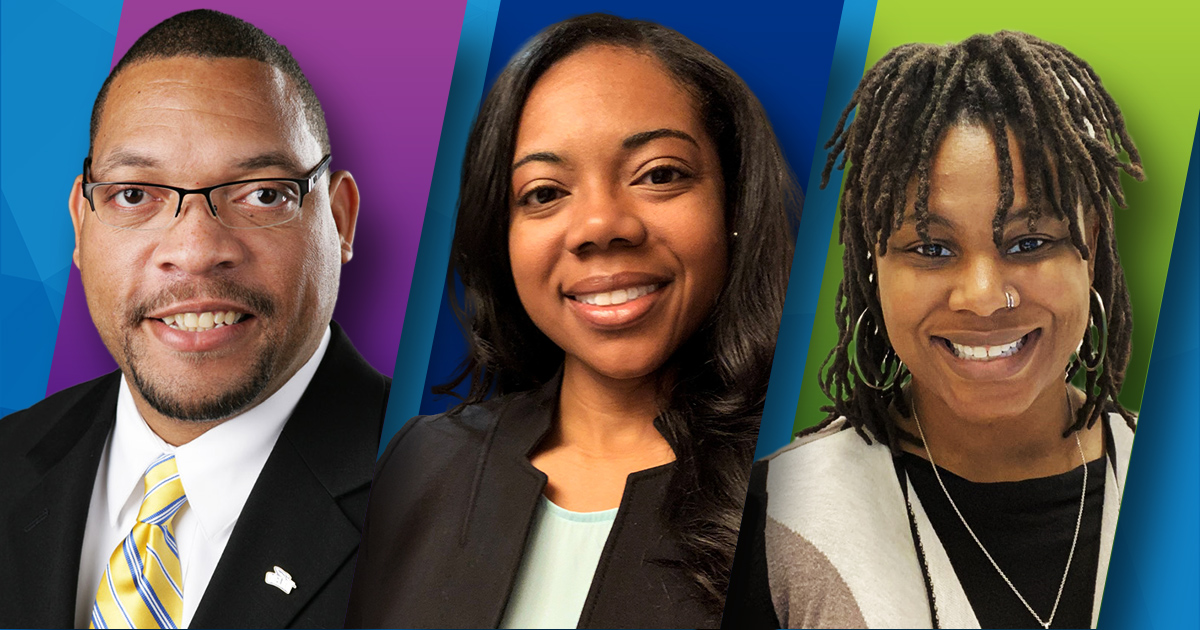Supporting the people who give of their time and resources to help ensure lifelong habits of wellbeing are fostered in the communities they serve is what NIRSA and the NIRSA Foundation are all about. One of the concrete ways the NIRSA Foundation fosters those students and professionals who lead the charge in the world of collegiate recreation is through scholarships, allowing recipients to attend NIRSA’s education and professional development events. The scholarship itself may be a onetime gift, but, as many of these scholarship recipients will attest, its impact is lasting.
Beyond networking opportunities, educational insights, and inspirations for new initiatives in the field, interacting with similarly-minded and motivated NIRSA peers revitalizes the energetic, can-do attitudes NIRSA members are known for.
If one was to give such energy a name, that name would likely be Caroline Dotts. Whether she’s climbing up on the NIRSA Foundation’s booth at Conference, racking up t-shirt sales or promoting her rec center’s Zumbathon, this long-time fitness instructor and current Assistant Director of Fitness at Georgia State University is constantly in motion, spreading a whirl of positive and supportive energy throughout not only GSU’s Department of Recreational Services, but also the NIRSA world—from the local level and beyond.
So when the Foundation awarded Caroline the William Wasson Endowed Scholarship (as well as the William Wasson Student Leadership and Academic Award) in 2009, allowing her to attend the Annual Conference that year in Charlotte, North Carolina, they not only made an apt choice, but, through Caroline’s continued enthusiasm and involvement, have supercharged the energy of NIRSA’s future.
The kind of energy that extends beyond just short bursts is tough to come by. It demands a continual mixture of dedication, drive, and stepping out of your comfort zone—but as the Foundation knows, this is exactly the kind of energy NIRSA needs to foster for the Association, and collegiate recreation, to continue being an impactful and critical force in the world of higher education. It’s what keeps us as a profession moving forward.
Fittingly then, stepping out of her comfort zone and challenging herself is how Caroline came to collegiate recreation. “When I was a senior in high school, I began teaching step aerobics at our hometown country club…After I was accepted to Belmont
If she was nervous about contacting the Recreation Director as a freshman or being the only student teacher, this certainly didn’t stop her from diving in and following her passions. Luckily—for Caroline and our Association—Angie and the Belmont folks were “steeped in NIRSA” and recognized the importance of the Association’s value. They not only encouraged Caroline to join NIRSA, but “challenged me to jump in as fast and as deep as I could those first few years of undergrad,” she says.
She jumped in and stayed, receiving a Masters in Sports Administration from Belmont, which is where she was when she received her NIRSA Foundation scholarship; “as soon as I started my graduate assistantship at Belmont University, I knew I wanted to work in Campus Recreation.” And those initial fitness classes? “Since then I’ve taught a group fitness class every semester for the past 10 years!”
This trend continued as Caroline made a “leap of faith,” during her final year of graduate school and took a job as the Fitness and Wellness Coordinator at Cleveland State. Describing herself as “consumed with staying in the South after school” and unable to fathom moving away from “creature comforts (like 60 degree winters and having family less than 30 minutes away),” moving to the snow belt of Ohio was not on her radar. Yet, after meeting, Sean Ries, CSU’s Associate Director at the time, Caroline was surprised to find that “his high energy and enthusiasm got me excited right away…even though this job would be 14 hours from home! Moving away from home and from everyone I knew was super scary, but I really got to see the stuff I was made of at CSU. And I came out of that job with so much more than I went in with—all because I was willing to step out of my comfort zone!”
Arriving at a point to where you can make “leaps of faith” like this doesn’t just happen—it takes great motivation to realize these opportunities, which Caroline well knows. During the 2009 Annual Conference she attended with her NIRSA Foundation scholarship, Caroline was determined to walk away with her first professional job and, thus, made the Career Opportunities Center (COC) her “home away from home.” However, while she’s grateful the COC was “such an awesome resource to help me land my first (and second) professional job,” Caroline recognizes that a great part of her success stemmed from the old adage about what happens when preparation meets opportunity.
Her “brag book”—a portfolio she created of “everything [she] did as a GA—filled a two inch notebook…and showcased the what and how of [her] job as a GA.”
The COC, Caroline advises, “can be an intimidating place if the first time you visit it is during your ‘search’ year. Luckily, my first visit was during a non-search year, and I was about to catch the flow of how things worked in there.” With this knowledge she was also able to add to the list of “must bring” items her mentor had provided her with, setting herself up to jump confidently into the job search. Though Caroline now laughs at some aspects of her overpreparedness—“I brought my own laptop, printer, and paper. I toted my laptop everywhere and would go back to my hotel room to print out things I thought I needed. I was such a newbie! All of that extra hardware was definitely not needed!”—most of them helped her make a major impression on perspective employers. One of her biggest assets? Her “brag book”—a portfolio she created of “everything [she] did as a GA. It filled a two inch notebook, was well-organized, and showcased the what and how of [her] job as a GA.”
Caroline’s motivation doesn’t just apply to her own advancement—scholarship winners are asked to volunteer some of their time at the NIRSA conference and while “most people think volunteering is for the birds…I like to equate volunteering to exercising,” Caroline says. “You can go, put in your time, and count the seconds until your shift (or stint on the treadmill) is over, or you can show up, figure out a way to make it fun, and watch the time fly by. I chose the latter and always have a great time heckling people to buy t-shirts and raffle tickets.” In fact, she jokes, “my true calling came in Charlotte when Chris Muller called me because the quilt/t-shirt table was short of volunteers. That day Suzi Smith, Chris, and I came up with a challenge: who could sell the most shirts in the two hours of my shift. We came up with some pretty creative methods of separating folks from their money—a lot of people remember me as ‘that girl that talked me into buying a ton of t-shirts’—but I do believe I won the challenge.”
The motivation to give back comes in many forms—and Caroline’s energy exudes them all! One way Caroline does this at Georgia State is by mentoring the staff members, graduate assistants, and student employees. Knowing what it’s like to be in their shoes, Caroline supports them by infusing much of her energy and experience into their collegiate recreation journeys. “I love the fact that I work with students on a daily basis and can develop them into young professionals every chance I get,” she says. One thing she makes sure to tell her students—apply for NIRSA Foundation scholarships!
“One of the excuses I hear all the time is, ‘well, my department is going to fund my trip to the state/regional/national conference, so why should I apply for a scholarship?’” Caroline says. There are many reasons, but, drawing from her own experience, she has a core three that she reminds her students of constantly:
- Experience—“Filling out those applications requires you to put into writing why you want to be in the field,” she says. “It also forces you to find a professional staff member to nominate you, thus creating an opportunity to foster a relationship with someone who is already in the field you are about to get into!”
- Prestige—“Let’s face it,” Caroline says, “’scholarship recipient’ looks awesome on any resume, but only those who apply have a shot at putting that particular phrase down on theirs.”
- To give back—“As a scholarship winner, you now have the opportunity to give back to the organization that gave to you. Maybe it’s as simple as buying at $10 t-shirt from the Foundation table; maybe it’s a big as being the nominator of one of your students for a future scholarship.”
For some folks, giving of time and talent feels like enough, but Caroline aims to take her contributions even further. Her passion for her students and her field are overwhelmingly clear: “almost all of us say we got into this field because we want to change the lives of our students. It’s why I chose Campus Recreation over Physical Therapy—I wanted to make an impact on the preventative side of health….However, I think we sometimes forget that just by donating $5, $10, or $100 to the NIRSA Foundation we are impacting students! We are creating a financial support for students who can’t afford to go to conferences but should be there. You might think you are just ‘giving away’ your money and not seeing the benefit of it, but then you probably haven’t spoken with a scholarship winner lately. We give back to pay it forward. Donors make the silent impact on student development, and I’m proud to donate my time, my efforts, and, yes, my hard-earned funds to the NIRSA Foundation!”
“We give back to pay it forward.”
For Caroline, being awarded a NIRSA Foundation scholarship was not only validating, but “it sparked [her] motivation to stay active in this great organization at the state, regional, and national level.” She says that “even three years after winning that scholarship, I have found a way to make at least two NIRSA-related conferences or workshops each year and take an ongoing, active role at the state level.” And that’s no overstatement. As the student state representative for TIRSA, a social committee member for ORSA, and now the social committee chair for GRSA, Caroline’s involvement at the state level of campus recreation is as dedicated and energetic as her Association-wide involvement.
Though, she says, “NIRSA Annual Conference is awesome, and regional meetings are amazing too, it’s the state, provincial, and local levels of involvement that are critical in one’s NIRSA development.” This, she says, is where one is able to really deepen one’s connections with colleagues across the state. “To work alongside of others at different schools in your state is priceless. You get to know them on a more personal level….You work with them behind the scenes at the state conferences and develop friendships. These people know your professional and personal life….It can open more doors for you at the next levels!”
Winning a NIRSA Foundation scholarship and attending conference “provided validation that I was choosing the right career path in Campus Recreation,” Caroline says. And “I’m forever grateful I was able to find a career in a field I absolutely love.”
In investing in Caroline, the NIRSA Foundation was also investing in that special kind of energy, drive, and dedication that has now spread through the international, national, regional, and local levels of collegiate recreation. They were, in other words, enacting their tagline: Supporting today. Ensuring tomorrow. “The NIRSA Foundation is only as strong as its base of supporters,” Caroline says. “I think we all know this, but knowing it and taking action on it are two incredibly different things.” And—from the top leadership levels of the Foundation to the students at Cleveland State and Georgia State just entering the field—there’s an ever-growing multitude of voices who can attest that Caroline is the latter. “Giving back to NIRSA is what this organization is built on,” she says. And, thanks to members like Caroline Dotts, NIRSA will no doubt continue building long into the future.


